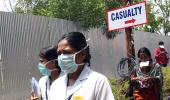This will also help test the effectiveness of preventing the entry of Nipah in target cells.

In what may be a breakthrough for India in vaccine production and development of monoclonal antibodies (MABs) against the Nipah virus, the Institute of Advanced Virology (IAV) in Kerala has developed non-infectious Nipah virus-like particles (VLPs).
This will also help in testing the effectiveness of preventing the entry of Nipah in target cells. This is a major development as India used to import antibodies.
During the 2018 outbreak, a non-patented drug developed by Christopher C Broder from Australia was imported for compassionate use from the University of Queensland.
Last year, Business Standard had reported that the Indian Council of Medical Research was in talks with the Serum Institute of India for local manufacturing of monoclonal antibodies (MABs).
The MABs are used on compassionate grounds for treating Nipah virus infections. However, it did not take off, as the volume was much less in India.
"This is almost like a clone of the original Nipah virus. It can be used in labs, diagnosis and in vaccine production," said Dr Mohanan Valiya Veettil, senior principal scientist at IAV, who led the study..
"In all, VLPs and virus outer coats are there. These can induce immunity, and at the same time, it will not be infectious. This is created using three virus structural proteins," Dr Veettil added.
Repeated Nipah outbreaks in Kerala -- affecting Kozhikode in 2018, 2021, and 2023, and Ernakulam in 2019 -- are turning out to be a concern for the country.
This year also, the state government has already come out with a special action calendar.
This includes vigorous Nipah prevention activities until September, intensifying awareness drives in these districts and issuing caution to people to not destroy the natural habitat of bats.
"We are in the first stage and have developed Nipah VLP. Second stage is to test this in mice and observe whether they are producing antibodies against Nipah. If it is producing antibodies, we can try it in humans," he said.
Details of the study were published in the international journal Heliyon by Cell Press on May 24.
At present, the facility to work on the live Nipah virus is only available at Pune's National Institute of Virology, the only Bio-Safety Level (BSL-4) laboratory in India.
With the VLP in place, other labs will also be able to do further studies on this.
"It can be used for vaccine production, diagnosis and for studying the entry of Nipah virus. Highly infectious viruses can only be handled at BSL IV facilities," he added.
This also takes into account the fact that the longest stability data for the antibody was 63 weeks and all the 20 doses imported during the 2018 outbreak went to waste.
The monoclonal antibody from Australia has been used on some individuals around the world. There has been no large-scale clinical trial so far.
In a small phase 1 trial, the antibody was found to be safe.
Therefore, experts felt the need for bigger trials before India could consider domestic manufacturing of the biological product.
Other team members at IAV, who were part of the study are Arathi Rajan, Anuja S Nair, Vinod Soman Pillai, Binod Kumar, Anupama R Pai and Bimitha Benny.
NIPAH OUTBREAK IN KERALA

- Before this, India reported two outbreaks in West Bengal in 2001 and 2007, in which 71 cases were reported, claiming 50 lives
Feature Presentation: Ashish Narsale/Rediff.com











